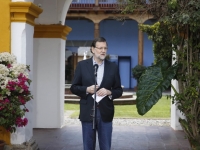Politics
Rajoy ratifies commitment of Spain to Guatemala on co-operation issues
Visit Guatemala

Rajoy during his visit (Source: Pool Moncloa)
USPA NEWS -
The President of the Spanish Government, Mariano Rajoy, underlined during his visit to the Spanish Co-operation Training Centre and Workshop in Antigua, that the main co-operation objectives from now to 2016 are training, equality between men and women and the fight against child malnutrition.
The Spanish President, Mariano Rajoy, started his speech at this Training Centre and Workshop by highlighting the "wonderful" relations that exist between Spain and Guatemala and said that both countries seek to improve and extend them even further. He declared that Spanish companies will continue to come to this country, investing in it and creating jobs, which, in his opinion, "is very important, very necessary and also good for all the people of Guatemala".
He also pointed out that Spain will continue to support Guatemala and all Central American countries in their relations with the European Union. But, above all, the President of the Government wanted to stress that this visit represents a commitment from Spain to Guatemala on co-operation issues. Co-operation which, "has been taking place for many years and will continue to do so in the future", he stressed.
In this regard, he explained that the main objectives under the Cooperation Plan 2013-2016 are training, "because it is key for people to find a job and be able to work"; equality for women, "a struggle in which there is still much to do in Spain, in Guatemala and everywhere else"; and the fight against "child malnutrition with all possible means available to us". These three objectives are, in his opinion, "the most noble aims that a human being can have". This Monday, the President of the Government of Spain is due to hold a meeting in Guatemala City with the President of the Republic of Guatemala, Otto Fernando Pérez Molina, following which he will take part in the SICA-ESPAÑA Summit.
Liability for this article lies with the author, who also holds the copyright. Editorial content from USPA may be quoted on other websites as long as the quote comprises no more than 5% of the entire text, is marked as such and the source is named (via hyperlink).






